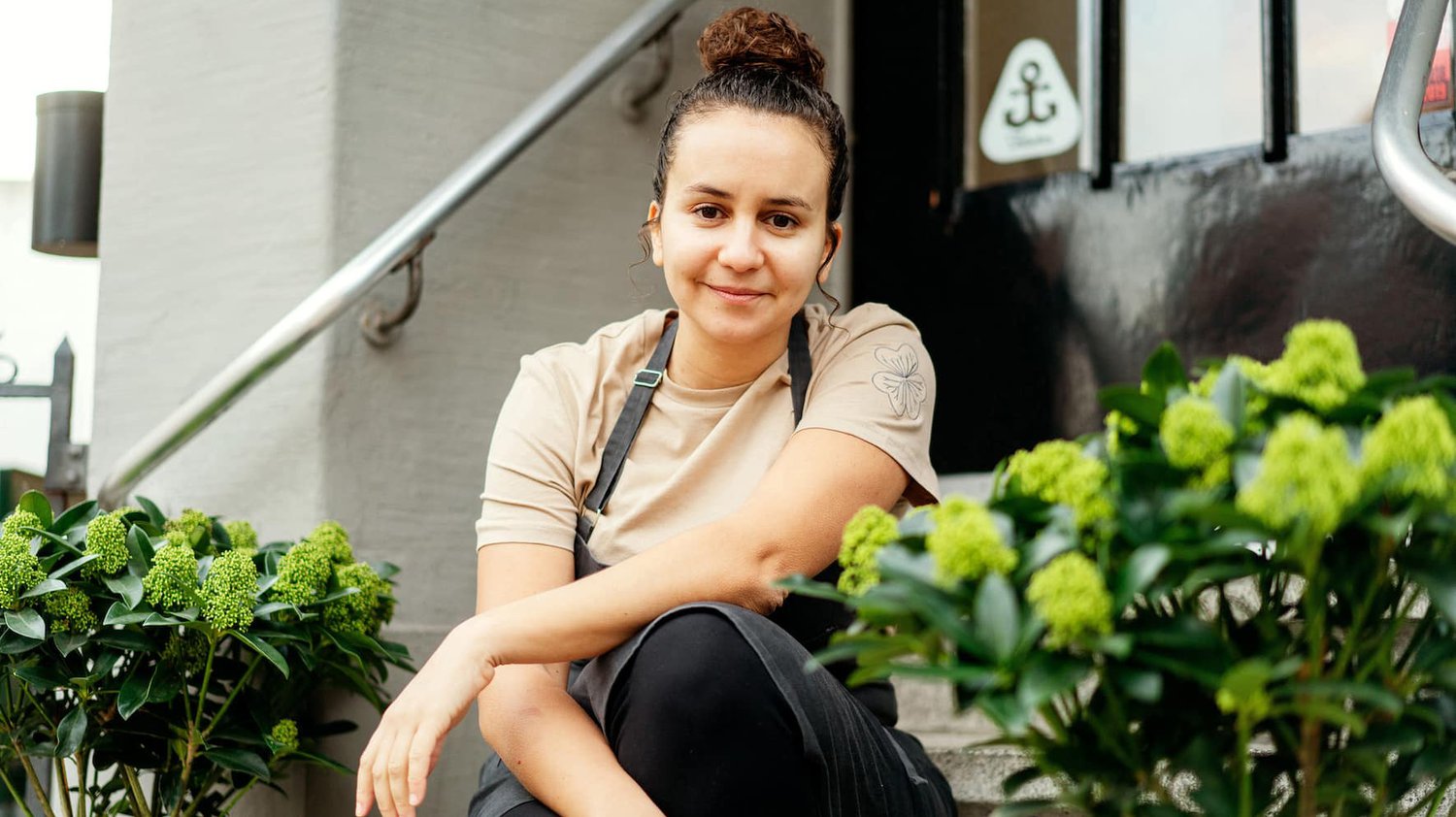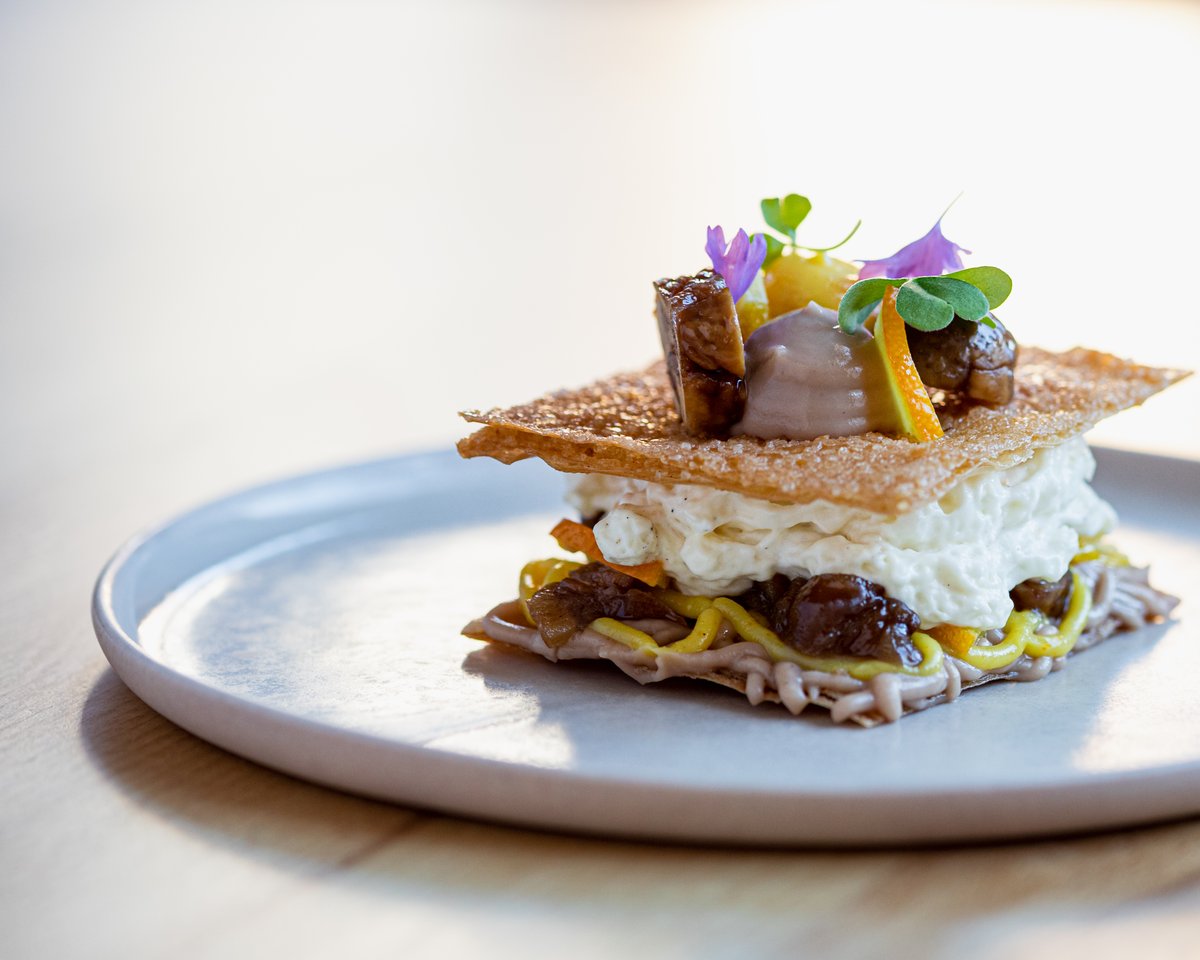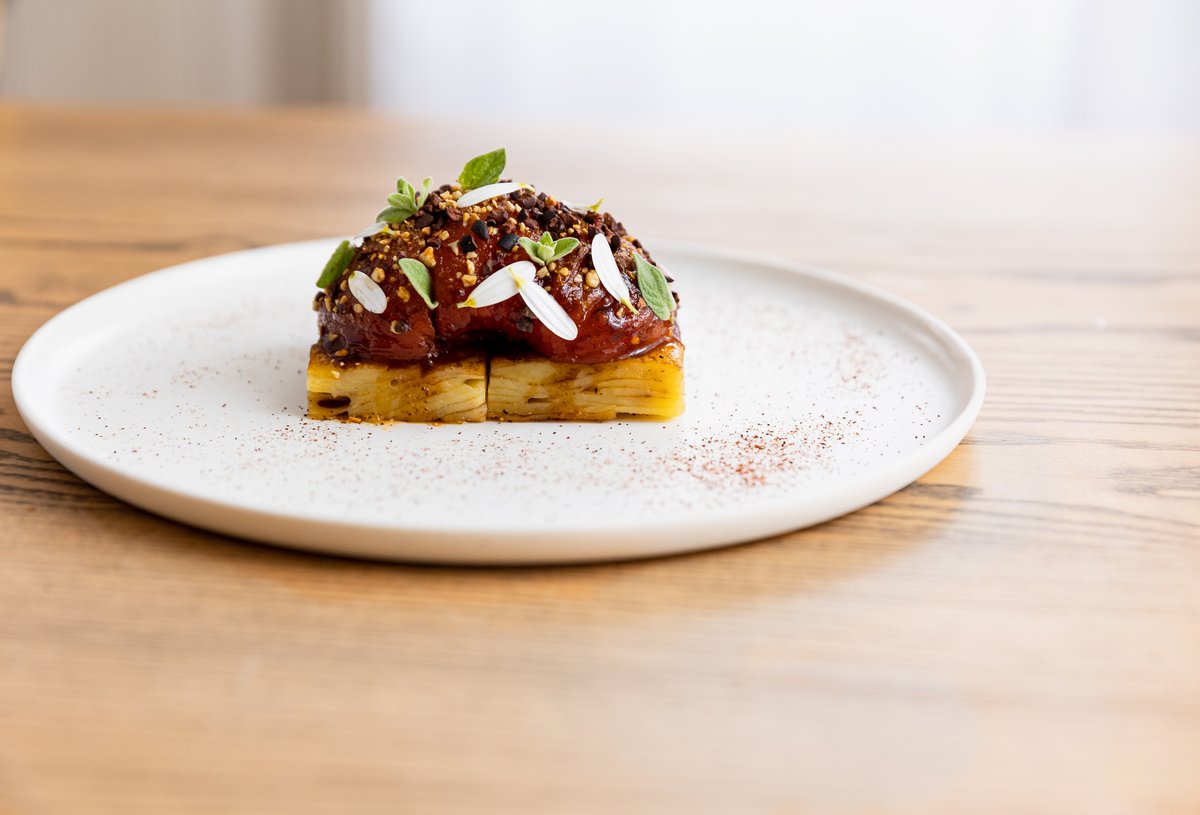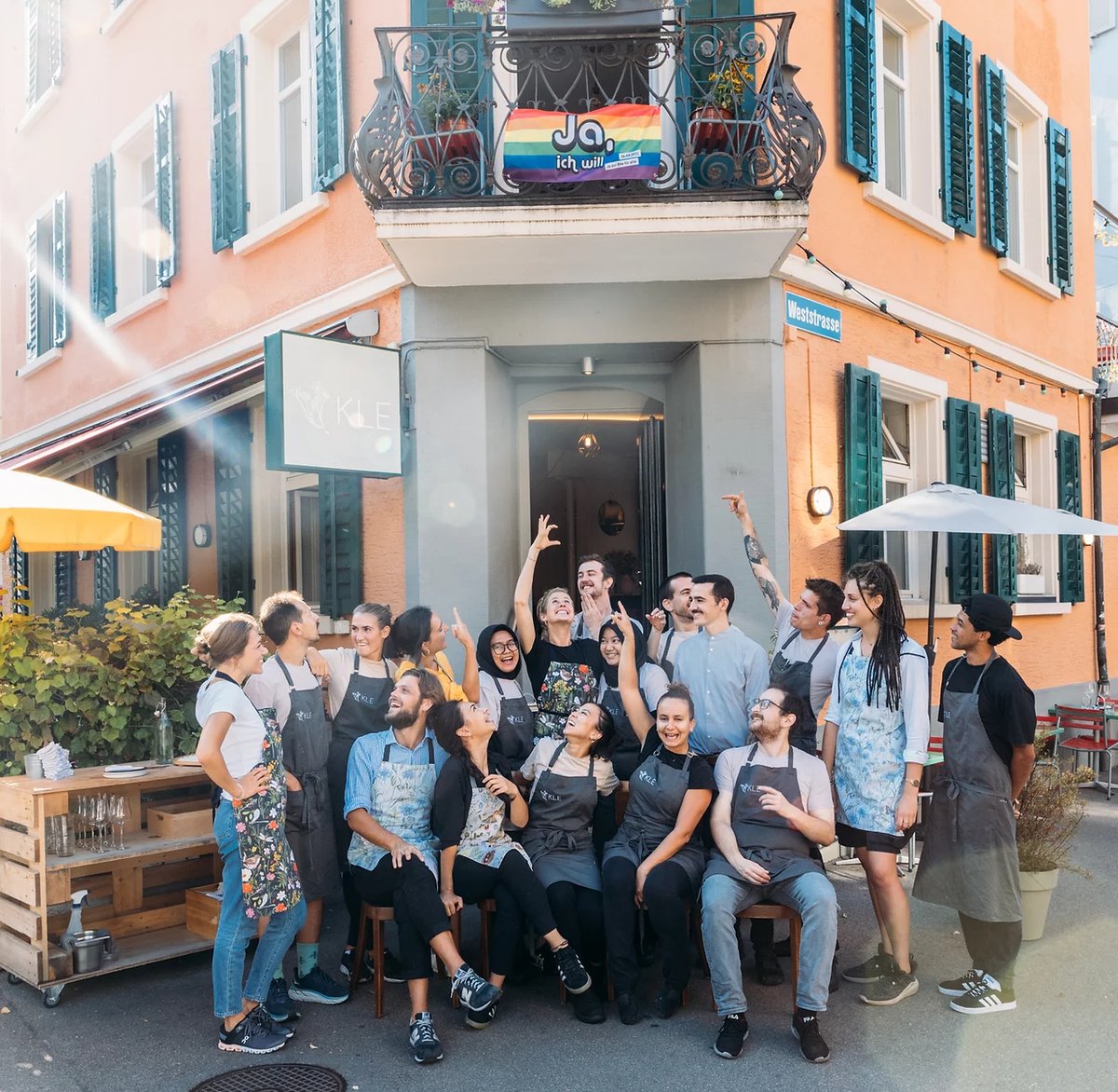Zineb Hattab
Chef Zineb Hattab speaks to us of challenges, diversity and the plant-based kitchen

Born in the Costa Brava, Spain, and growing up living close to the sea with parents who immigrated from Morocco, Zizi Hattab acknowledges the struggles of her parents, settling into a new place, surviving, and working hard while taking care of children. Zineb has always been predisposed to having a solid character and believes that you can be successful if you truly believe in something, and you work hard.
One might say that Zineb has lived two lives; one, a stable job in the corporate world as a software engineer, having all the comforts of a stable income and career path, then another life, that began when one day she decided to change careers and go into the restaurant world. Now she owns two plant-based restaurants: KLE and DAR in Zurich. This was her real life; she entered this world already older than her peers, but she could not stop the burning passion and threw herself into this new career. This year, she was recognised for «helping destigmatise veganism» and named a 'Hospitality Pioneer' in the second edition of The World's 50 Best group's 50 Next list.
When we spoke to Zineb, she was in the fields at her supplier’s farm where she visits with her team every month. That is her dedication and attention to detail.
So what made you give up the predictable future and stable nine-to-five for the raw kitchen realities while starting from the very bottom?
It was a desire to feel the human side of life; as a software developer, you don't get to communicate and exchange real human emotions very much.
After finishing my studies in 2011, I continued my career as a software engineer in Spain but was already considering moving away from this field for a better way of life. I always felt a strong passion for cooking, although I'm not part of that narrative where the grandmother gifts you that sweet memory of home cooking. I was living with my immigrant parents, who worked hard, and eating was more of a daily routine, not a family tradition to be lingered over. Although, when our relatives were visiting us from Morocco, we certainly ate some exceptional dinners then. Moving to university, I had to feed myself; that’s when I started digging deeper into the cookery books to add variety to my daily meals and get out of the routine of living solely on pizza and pasta. I was endeavoring to cook for myself and my friends, determined to finish my studies as a software engineer.
Giving passion a chance
At the end of 2013, I decided to resign and spend a year as a stager, working for free in the world's best kitchens. This decision was difficult, my parents expected me to write a doctoral thesis and have a solid path. I started at Nerua in Bilbao, with purist, minimalist chef Josean Alija. Then it was on to Andreas Caminada and his 3-star Schloss Schauenstein, in Switzerland. He is a terrific mentor and a true ambassador for his country. He has incredible charisma, and because of him, I fell in love with Switzerland. He’s the perfect example of a great leader with a brilliant work ethic. I left him for a stage at Massimo Bottura's Osteria Francescana in Modena, promising to return. During that time, I also managed to do a short stage in El Celler De Can Roca in Girona, Franzen in Stockholm, and the legendary Faviken which has since closed.
I was older than the rest of the stagers; therefore, I didn't want to go to just any restaurant but to specific esteemed establishments that hold a philosophy and have an impact, to be around people as passionate as me, and be challenged.
All these prestigious kitchens at that time could have said no, but I was lucky. I did a lot of research (sometimes meticulously listing pros and cons in an Excel sheet) before choosing a place to put my efforts, and luckily I was accepted with no previous experience by all these great places. I pushed myself, and these restaurants were patient with me; Andreas Camminada later offered me a job, where I stayed for three years. I ended up working in his test kitchen and we travelled the world together.
A bigger challenge
There is no doubt that Switzerland is a very comfortable place to live, but it was time for a more significant challenge, so I moved to New York. Upon arrival, I'd already had an offer at Blue Hill at Stone Barns, as I had met Dan Barber through Andreas. Later I met chef Daniela Soto-Innes (named World's Best Female Chef by the World's 50 Best Restaurants) from Cosme, and initially, it was just about gaining knowledge of working with corn and understanding the primary Mexican flavours.
New York seemed to be a place with values and systems different from those seen in Europe. Even though I was following the American political and cultural agenda, I'd say I was hit with culture shock, living there felt completely different from anything I’d ever known before.
I experienced a different attitude towards the work-life balance. There you live to work, the environment is highly competitive, 7-days with long, busy hours. You either do it or you don’t survive. Time off and health are not highly valued either. For two years, I'd been living this life, but the previously learned values of work and people appreciation, and the healthier work environment called me back to Switzerland.
In New York, it seemed that you get the best and the worst of things, living with these extremes of divine inspiration from art and music, diversity of thought in a flourishing multicultural environment, and then there is the violence, crime, all this is exposed to society. In more recent times, during the pandemic, many chefs left the city because there was almost no help during the Covid closures.
At Cosme we were serving 300 covers a night compared with a maximum of thirty at Schloss Schauenstein, but it made me a professional, I proved myself, so the hard work paid off.
Back to the peaceful land
My values are strong; considering all my past experiences, I had a determined vision of how my team should feel and how the work should be organized, starting from the human side.
We are talking now from the farm where all the team is hearing about the permaculture and the organic produce from our farmer. I think this will also cultivate a sense of respect in them; there's also the food waste to be considered here.
We have three farms that supply us, family farmers and organic farms that don't raise cattle, only plants. One of them is an animal sanctuary, they save them from slaughter, so animals such as sick horses get a chance to continue living. The farms are all adapted to the ecosystem; you see them full of blooms, and birds are all around, it regulates itself. It is essential for us as we want to have a long-term relationship as their produce dictates the menu. We even have Mexican chilli, grown locally as well as tomatillo and nopal. It’s surprising but climate change has actually made this possible.
If you believe in it you will get there.
We opened in Zurich in 2020, obviously unaware of the upcoming pandemic. When that happened, I was in shock, and expected the total failure of my dreams. We had substantial government support, and we devised some special delivery projects such as our e-shop gourmet shop and delivering boxes of our produce, it was enterprises like this that kept us afloat. As for all the people from our business, we had time to reconsider our values, to reflect on our opening, and determine if we were going in the wrong direction. It was a good reset, we did not fall into the trap of burying ourselves in routine without a decent work-life balance.
Being a stagiaire
It was challenging. Think of me, coming from a corporate world, with strict work ethics and work customs that you usually get from big companies. It was a crucial change of perspective and break from the norm. It’s quite ironic that while the hospitality industry is focused on creating a positive environment, making guests feel welcome like family, it treats its real family, those employed in the industry, in the worst way, generating mental health issues, even ruining lives. I was younger at that time and many things I experienced I wouldn't put up with now. I was lucky to not experience as much abuse as some of my peers, I also believe the environment has changed in the last ten years.
This was one of my greatest motivations to open a business, I was reflecting a lot on this, thinking « How on earth this can be real?». It pushed me to show how it could be done differently. I want my chefs to be inspired to stay in my kitchen for many years, not burn out in a few years’ time. Everybody can speak up here, they can also change roles. They can be a host one week, then be serving at the bar the next, being confident and empowered is how I see my team. Putting all the focus on one person is just not sustainable.
I question myself every day, but there is also constant dialogue with the team. Their input is essential for me, as they are the right people for me. It would be more profitable to be open seven days a week but I decided to make it five. I admit I lose money this way, but it serves another purpose. We have the same days off every week, usually in the kitchen it’s disordered in terms of planning when you get different days off each week and consequently, you’re not able to plan your life.
Being a female chef.
Funnily enough, I was also in the minority throughout my software engineer career, both by being female, and being an immigrant. Balance is a key for all, we try to balance all aspects, we are multinational and we pay attention to having different sexual orientations in the kitchen. There's still work to be done to create a safe space for women, and if they decide to leave to have a child, they should be free and confident to come back.
Sexual orientation is still a taboo in gastronomy
For me it doesn't seem productive, this narrative in 2022. We spread the message of love, hospitality, sharing, so why would it be an issue? It’s a world, that remains male-dominated.
There’s a lot of work to do and I feel positive to stand up and talk more about it, I feel strong support from my team. Otherwise, we just get lost, society should be informed, should care more. We stood up during Pride month, even explaining to some people the nature of what we celebrate, the same as putting forward the issues of being a woman in the kitchen, and why it’s important they have management roles.
The team you'd not expect
My sous-chef is an athlete and he needs time to train for competitions. We have others working only 60% due to their studies, some people involved in service are currently doing Agriculture & Sustainability studies and work three days with us. Others are just led by passion like me, people who have a clear vision of what they want, just like I did, and experience our kitchen and farm without prior experience or an educational base. Working, travelling, and eating gives you a great perspective of the world. We are diverse and so we are a magnet to diverse young and creative people, a young girl from Morocco who comes to Switzerland will know that in my kitchen she will be respected and feel confident.
Being a vegan restaurant in Zurich
We have two entirely plant-based restaurants, KLE and a small sister bistro. You might see it as a rather strange idea opening a plant-based restaurant in the country of cheesemaking, iconic chocolate and meat. Zurich is blooming now, it’s becoming a hub, a place of meeting cultures. We are a small restaurant, I like to be able to remember every guest, and so my team knows them and connects with them. I never wanted to get into the 300 covers a night system, it’s not about money for me.
There are only 3 fully vegan places in Zurich and two of them are mine; there are also some vegetarian venues in the city. I don't put too much weight on the fact that we are plant-based, when you enter the restaurants, they’re not screaming plant-based. We are showing how good it can be, it’s not forced, you see how it can stay in line with regular restaurants using our techniques and skills. Six-courses with a wine pairing will feel just like a regular dinner, there’s no sense of something missing or of not having familiar flavours and textures, this is what we achieve every day.
I took a lot of influences and techniques, the quality attention from fine dining, but we avoid being elitist in service, we are not religious to that ceremonial narrative. The labour is quite expensive here, so eventually, we settled on the same price range as you'd find in a fine dining venue in places such as Barcelona.
Normalising plant based, cancelling the stigma of it. Making it delicious.
We see what is in season, carrot next to fennel and wild spinach and we gratefully take everything that is around.
From the technical side, we know how the combinations work for the palate. I use a lot of seaweed, black salt that makes you this saline sensation from the ocean, without fish. I know this because I’ve had a lot of previous experience working with fish. I know the reaction it causes in the brain. Being sensitive and attentive to our palate and brain’s reaction within the plant world, that's what is important.
Cover Image: Erna Drion, Pascal Grob








